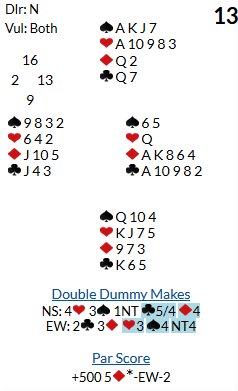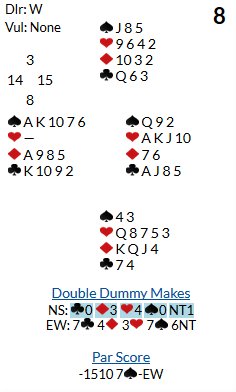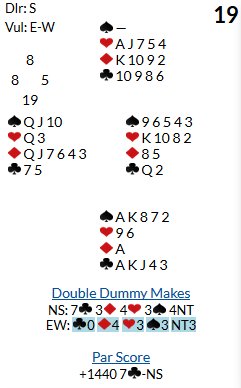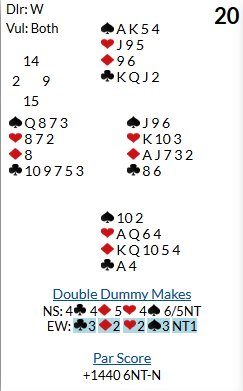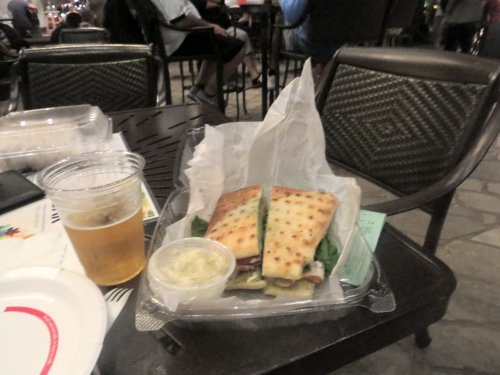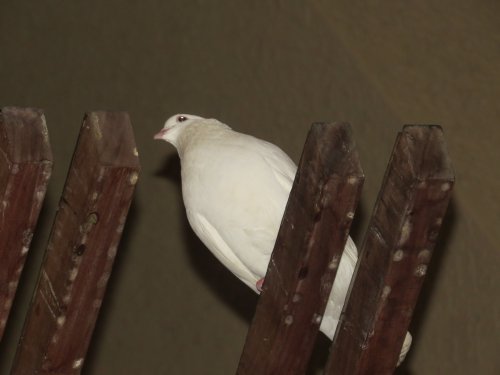I arose at 4:00 a.m., which was not at all out of character for me. Monday was the day that most of the podcasts to which I ordinarily listened dropped. So, I extracted my Bose headphones from my suitcase and listened to Le Show, This American Life, and Nobody Listens to Paula Poundstone. By then I was tired again and fell back asleep.
I woke up again a few hours later. The plan for this day was for Ann and me to play in the Daylight Open Pairs. This was just a regional event, and so there would be, at least in theory, less pressure on us.
I made some coffee. The coffee-maker in the hotel room was unusual in that you could make two cups at a time. It even provided a way to make a regular[1] coffee in one cup and a cup of decaffeinated simultaneously. However, religiously following the directions on the lid was absolutely necessary. Mistakes could easily lead to overflows. I admit to being responsible for several messes over the course of the week when I tried to operate the machine while still half asleep.
I did not want to eat a big breakfast before playing. I tended to get sleepy and lose concentration when I consumed carbohydrates. I therefore went to the ABC Store and purchased a bowl of fruit that was mostly pineapple chunks and a large coffee. The latter was necessary because portable cups were not provided in the hotel room, and I had not brought or purchased one.
We seemed to play pretty well in the morning, and the competition did not seem as tough as it had been on Saturday. Still, our results were below 50 percent.
I picked up a sandwich, a large bag of chips, and two Diet Cokes at ABC. I brought them up to the room. Sue had played the same hands in the Gold Rush Pairs. During lunch we went over a few of them together.
One of the worst hands for Ann and me was #13, which our opponents played in a hopelessly optimistic 3NT contract. Ann, sitting East, had a rather difficult decision about which diamond to lead. If my hand had had only two diamonds instead of three and an outside entry, the fourth-best diamond would have represented the only chance of scoring more than three tricks. However, on this layout if Ann had led a high diamond first, I would have played the 5, the lowest outstanding diamond. Because we use upside-down attitude, she would have known that I liked diamonds. If she played the other high diamond next and then a low diamond (to ask for a club return), we would have raked in the first six tricks.
I don't think that it was reasonable to expect Ann to figure out that declarer's queen would drop. There were probably times when it is best to avoid leading a high honor when one has the AK, but this was not one of them. Ann had thirteen points. The opponents probably had at least twenty-five. The probability that I might have an outside entry was too low to rely on.
In fact, the declarer won the first trick, four spades, and five hearts before Ann got in again for the last three tricks.
The afternoon session was bizarre. Something was drastically wrong with the overhead lighting in the Coral Ballroom. The lights continually dimmed in phases and then came back on at full power for a few minutes. Sometimes it got so dim that play was nearly impossible for me and probably worse for any players who suffered from vision problems. At one point play was halted while the directors tried to induce the hotel to address the problem.
The most interesting incident happened at another table. We were sitting North-South next to Wayne Burt and Jim Felch from New Hampshire, who were sitting the same direction. We could not avoid hearing quite a bit of hubbub emanating from their table.
Three weeks after the end of the tournament I asked Wayne about it. He remembered the incident, and after a little more research and interrogation he related this story.
Their opponents in the first round were playing 2♦ as Mini-Roman (minimum opener with at least four cards in three suits) and 2♥ as Flannery (minimum opener with five hearts and four spades). On hand #8 West opened 2♦, which was alerted. North (Jim) passed without asking about the alert. East, mistakenly thinking that the bid was Flannery, bid 2NT, which was also alerted. In Flannery 2NT asks about the distribution of the minors and the strength of the hand. In Mini-Roman it asks for the short suit.
At that point South (Wayne) asked about the alerts. East said that the 2♦ bid was Flannery. West blurted “It was not!” Wayne called the director, who talked to both East and West (separately) away from the table. He ordered East to interpret all of West's calls as Flannery responses. He also admonished West to interpret all of East's subsequent calls as Mini-Roman.
West then bid 2♥ to show the heart shortness. East bid 4♥, which was the required Flannery bid, but in Mini-Roman showed a game-going hand with no interest in playing in any strain except hearts.[2] Nevertheless, West corrected to 4♠, which was passed out. That contract made with overtricks.
When the hand ended, the directors were called to the table again. Wayne averred that he and his partner should have been told what was going on. The head director insisted that North-South already had more information than they were entitled to, and the directors had handled the situation correctly. In the end the directors changed the result to 4♥ down 1, which I think was the correct ruling. Under no circumstances should someone playing either convention correct a game contract bid by the responder, who was always the captain.
So, that was how Jim and Wayne got +50 on a hand in which the opponents can make a grand slam in either of their eight-card fits. We played against the pair that had the mix-up in the next round, and the incident definitely seemed to leave them flustered.
We scored a little above-average in this session, and we barely scratched. This was the first time that Ann and I did as well in the second session of an event as we did in the morning.
There were enough good moments in this round to give us reason to hope that we could put together two good rounds in the Mini Blue Ribbon Pairs on Tuesday, but we still failed to take advantage of several opportunities. On two consecutive hands we missed slams.
We played hand #19 in 5♣. I like Bergen's 4x4 criterion[3] to decide whether to open a hand 2♣, but Ann, who was sitting South, used a different algorithm that involves counting likely tricks. She deemed that her hand was a little too weak and opened 1♠. When I responded only 1NT, slam was extremely difficult to reach.
We had a very sharp arrow in our quiver that might have done the job. Many good players avoid using 2♣ with two-suited hands. However, Ann and I used Kokish Relays, which was specifically designed to help with those hands. If Ann had opened 2♣, I would have responded 2♦, which showed at least an ace, a king or two queens. Ann would have rebid 2♠, which was an unbreakable relay to 2NT. Here next bid, 3♣, showed a hand with spades and clubs.
I would raise to 4♣, which in this sequence was a strong bid. Ann would then probably cue her ♦A, and I would cue my ♥A. After she cued in spades, I would have bid 4NT. She would show the three missing key cards. I would know that she could not possibly have no key cards. I would therefore feel confident about bidding 6♣, which, when the trumps split, was cold for seven.
Ann also made six on hand #20, but I don't see how we could possibly have bid this one. The opponents had an ace, a king, a queen, and two jacks! Furthermore, the contract goes down if South played the hand (as would be the case for strong notrump teams), East found a diamond lead, and West played both red suits perfectly.
For supper Sue and I went to the Tapa Bar, which has no kitchen, but they do have a menu. Customers could order sandwiches that were prepared at one of the other restaurants and brought over to the bar. The system seemed to us to work rather well. I ordered a turkey pesto sandwich and a glass of Stella Artois. This was not a bad meal. I definitely liked it better than sitting cheek-to-jowl with other diners. There was plenty of room, the lighting was perfect, a band was warming up, and birds were in the rafters. Sue, who really enjoyed listening to almost any kind of live music, liked the Tapa Bar so much that she stayed there after I headed upstairs to our room. I later learned that Sonja Smith, Paul Burnham, and a few strangers joined her for a small party. The band was not to my taste, and I wanted to get a good sleep so that I could be at my best in the Mini Blue Ribbon Pairs on Tuesday.

